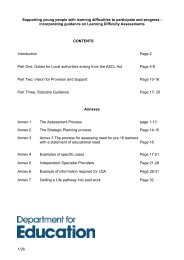What is the research evidence on writing? - Department for Education
What is the research evidence on writing? - Department for Education
What is the research evidence on writing? - Department for Education
You also want an ePaper? Increase the reach of your titles
YUMPU automatically turns print PDFs into web optimized ePapers that Google loves.
Pre-school attainment<br />
Children attending Recepti<strong>on</strong> Year have been assessed using <str<strong>on</strong>g>the</str<strong>on</strong>g> Foundati<strong>on</strong> Stage<br />
Profile (FSP) scales 10 .<br />
Analys<str<strong>on</strong>g>is</str<strong>on</strong>g> of <str<strong>on</strong>g>the</str<strong>on</strong>g> 2012 data shows that:<br />
- The majority of children (ranging from 71 per cent to 92 per cent) c<strong>on</strong>tinued<br />
to work securely within <str<strong>on</strong>g>the</str<strong>on</strong>g> Early Learning Goals, in each of <str<strong>on</strong>g>the</str<strong>on</strong>g> 13<br />
assessment scales.<br />
- Writing <str<strong>on</strong>g>is</str<strong>on</strong>g> <strong>on</strong>e of <str<strong>on</strong>g>the</str<strong>on</strong>g> topics assessed in <str<strong>on</strong>g>the</str<strong>on</strong>g> Communicati<strong>on</strong>, Language and<br />
Literacy learning area, and in 2012, 71 per cent of children were working<br />
securely within <str<strong>on</strong>g>the</str<strong>on</strong>g> early learning goals. Th<str<strong>on</strong>g>is</str<strong>on</strong>g> means <str<strong>on</strong>g>the</str<strong>on</strong>g>y had a scale score of<br />
6 points or more, and it was <str<strong>on</strong>g>the</str<strong>on</strong>g> lowest proporti<strong>on</strong> of pupils am<strong>on</strong>g all<br />
learning areas.<br />
- Girls per<strong>for</strong>med better than boys in <str<strong>on</strong>g>the</str<strong>on</strong>g> assessment.<br />
- Writing was also <str<strong>on</strong>g>the</str<strong>on</strong>g> assessment scale with <str<strong>on</strong>g>the</str<strong>on</strong>g> highest proporti<strong>on</strong> of children<br />
working towards <str<strong>on</strong>g>the</str<strong>on</strong>g> early learning goals (i.e. achieving a total of 1-3 points)<br />
(DfE, 2012d).<br />
Key Stage 1<br />
In 2012, 83 per cent achieved level 2, <str<strong>on</strong>g>the</str<strong>on</strong>g> expected level, or above in nati<strong>on</strong>al KS1<br />
teacher assessments in <strong>writing</strong>, compared with 87 per cent of children who did so in<br />
reading, 88 per cent in speaking and l<str<strong>on</strong>g>is</str<strong>on</strong>g>tening, 91 per cent in ma<str<strong>on</strong>g>the</str<strong>on</strong>g>matics and 89 per<br />
cent in science. Fourteen per cent of all pupils achieved level 3 or above, which again<br />
was <str<strong>on</strong>g>the</str<strong>on</strong>g> lowest proporti<strong>on</strong> am<strong>on</strong>g all subjects.<br />
Looking at <str<strong>on</strong>g>the</str<strong>on</strong>g> last five years, pupils’ per<strong>for</strong>mance has increased slightly, from 80 per<br />
cent achieving level 2 in 2008 to 81 per cent between 2009-2011. There has been a<br />
<strong>on</strong>e percentage point increase in <str<strong>on</strong>g>the</str<strong>on</strong>g> proporti<strong>on</strong> of pupils achieving level 3 in 2012<br />
since <str<strong>on</strong>g>the</str<strong>on</strong>g> previous year. The table below presents detailed data <strong>for</strong> <str<strong>on</strong>g>the</str<strong>on</strong>g> proporti<strong>on</strong>s<br />
of pupils achieving level 2 or above.<br />
10 The Early Years Foundati<strong>on</strong> Stage Profile measured achievements of children aged<br />
five against 13 assessment scales, with 9 points within each scale (‘scale point’). The<br />
13 assessment scales are grouped into six areas of learning: pers<strong>on</strong>al, social and<br />
emoti<strong>on</strong>al development; communicati<strong>on</strong>, language and literacy; problem solving,<br />
reas<strong>on</strong>ing and numeracy; knowledge and understanding of <str<strong>on</strong>g>the</str<strong>on</strong>g> world; physical<br />
development; creative development.<br />
32
















